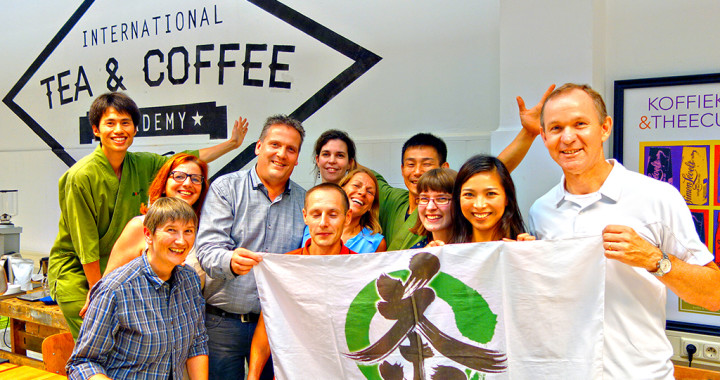Even if a small country in Europe – the Netherlands, did not want to let us leave too soon. After a fun evening in a liberal city Amsterdam, we packed our tea to go to the Hague, where the International Tea and Coffee Academy was waiting for us, thanks to our friend and host Tomoko-san who made such a beautiful connection.
The event was probably the most unique of all, because all 20 attendees were either current or aspiring tea professionals. So while we had prepared a presentation and tea tasting for the event, there was no time for silence, as it all was filled with curious questions. What water is the best for tea? How does organic tea quality compare with the conventional tea? What is the tea roasting process like? Such difficult questions as these got thrown our way and we were more than happy to catch them. We may not be able to answer all the questions all the time, but what a great learning opportunity it is!
So just to give you a quick snapshop, what water is the best for tea? We could talk all we want about how hard or soft the water is, but according to Matsu-san the best water is the water that comes from the area where the tea is produced, because a tea plant uses the same water for its own growth. If it is good for a tea plant it is good for a tea cup too;]
It is really difficult to compare the quality of organic and conventional tea, because there are so many different aspects to talk about: production amount, flavour, health effects, etc. It is more difficult to make organic tea than conventional tea due to slower growth and more natural dangers as weeds and pests. The flavour of organic tea is said not to be so pronounced as conventional tea, though the difference is slight and it would be hard to tell which is which if you tried both blindsided. Organic tea often is more appealing, though, because of the restriction on the use of chemicals, but the use of chemicals for conventional production, when following the regulations, is so small that it is often difficult to detect. This is an oversimplified and quick look into a difficult debate, and leaves you to make your own conclusion.
Having had such an inspiring learning time, we didn`t want to leave and kept chatting and sipping tea with Deirdre and Richard, leaders of the academy as well as their students until quite late. Conversation with tea-minded people immediately gives ideas for future project and collaborations. What about a tea research tour in Japan? What about a tea learning exchange program between the Netherlands and Japan? We are excited and hope to see these and similar ideas to come true.

Hague Japanese Tea Workshop – 13th September, 2014
Posted in World Tours.
